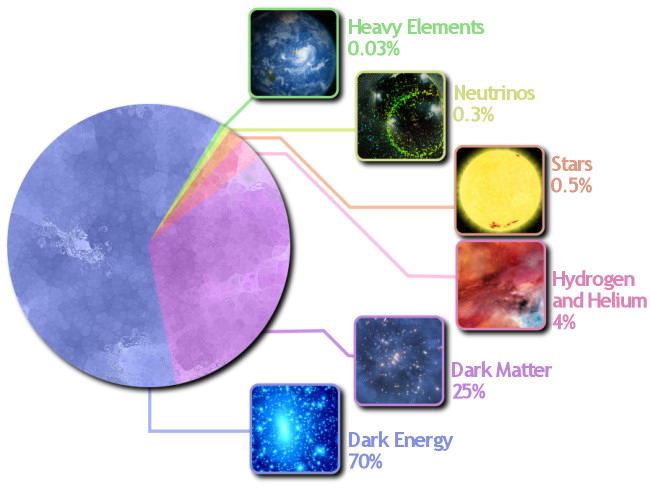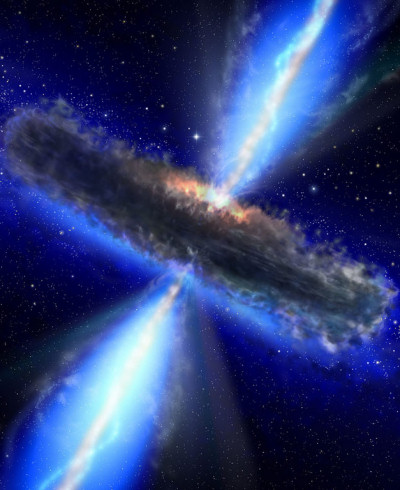


| The Fate of the Universe |
The fate of the universe hinges upon the tendencies of an
invisible force called dark energy. Dark energy is a repulsive
force in opposition to gravity, essentially a sort of
"anti-gravity." Where gravity tends to hold atoms together,
dark energy pulls them apart.
It is generally believed that about 70% of the universe is
composed of dark energy. Dark matter accounts for most of
the remaining matter. Nebulas, stars, and heavy elements that
make up planets barely account for 5% of the universe's total
mass.
At this point, the effects of dark energy is only vaguely
understood, but it is generally believed that the strength of
the force created by dark energy does indeed hold the key to
the universe's fate. There are
three possible outcomes, each one determined by the overall
strength of dark energy versusthe overall strength of gravity.
invisible force called dark energy. Dark energy is a repulsive
force in opposition to gravity, essentially a sort of
"anti-gravity." Where gravity tends to hold atoms together,
dark energy pulls them apart.
It is generally believed that about 70% of the universe is
composed of dark energy. Dark matter accounts for most of
the remaining matter. Nebulas, stars, and heavy elements that
make up planets barely account for 5% of the universe's total
mass.
At this point, the effects of dark energy is only vaguely
understood, but it is generally believed that the strength of
the force created by dark energy does indeed hold the key to
the universe's fate. There are
three possible outcomes, each one determined by the overall
strength of dark energy versusthe overall strength of gravity.
Closed Universe
If gravitational forces are ultimately more powerful than the forces
exerted by dark energy, then, tens of billions of years in the future,
the forces of gravity will ultimately halt the outward expansion of
the universe. In this version of doomsday, all matter and energy will
collapse into an infinitely hot, dense singularity, in a cataclysmic
reverse of the Big Bang. This scenario currently looks the least
likely to occur, unless the powerful effects of dark energy somehow
reverse in the distant future.
exerted by dark energy, then, tens of billions of years in the future,
the forces of gravity will ultimately halt the outward expansion of
the universe. In this version of doomsday, all matter and energy will
collapse into an infinitely hot, dense singularity, in a cataclysmic
reverse of the Big Bang. This scenario currently looks the least
likely to occur, unless the powerful effects of dark energy somehow
reverse in the distant future.

Though it is possible the universe itself will last forever, the myriad structures within its
boundaries will almost certainly be destroyed. At some distant point in the future, entire
galaxies will come to know an enemy far greater than any previously encountered... the
universe itself. The forces of nature could tear asunder every structure within the
universe atom-by-atom until nothing is left... crush everything out of existence in a
destructive reversal of the Big Bang... or the universe could simply endure a long,
protracted cold demise.
boundaries will almost certainly be destroyed. At some distant point in the future, entire
galaxies will come to know an enemy far greater than any previously encountered... the
universe itself. The forces of nature could tear asunder every structure within the
universe atom-by-atom until nothing is left... crush everything out of existence in a
destructive reversal of the Big Bang... or the universe could simply endure a long,
protracted cold demise.
Dark Energy

Open Universe
If dark energy ultimately proves vastly more powerful than gravity,
it could theoretically overpower all fundamental forces of nature
and literally disintegrate the entire universe, ripping it apart
atom-by-atom until nothing remained. This could happen 20 to 30 billion years from now. First, galaxies
would be torn apart, then solar systems. A few months later, all stars and planets would begin to
explode, followed shortly by atoms. Time would then stop. Though the possibility of an open universe is
still within the realm of possibility, most scientists presently believe that dark energy is simply not
powerful enough to destroy the universe in such a violent manner.
it could theoretically overpower all fundamental forces of nature
and literally disintegrate the entire universe, ripping it apart
atom-by-atom until nothing remained. This could happen 20 to 30 billion years from now. First, galaxies
would be torn apart, then solar systems. A few months later, all stars and planets would begin to
explode, followed shortly by atoms. Time would then stop. Though the possibility of an open universe is
still within the realm of possibility, most scientists presently believe that dark energy is simply not
powerful enough to destroy the universe in such a violent manner.
Flat Universe
If dark energy remains a constant strength, then the universe
could, theoretically, expand indefinitely. Alas, while the universe
itself endures, everything within its confines nonetheless endures
a long, cold demise. Over the course of the next trillion years,
galaxies will exhaust their gas in the formation of new stars. Ten
trillion years after that, most of the universe's matter will be locked
up in dead stars--black holes and burned-out white dwarfs, all of them spiraling toward oblivion inside the
super-giant black holes at the center of their respective galaxies. Given enough time, even the black
holes will begin to evaporate and any matter not inside of a black hole will simply fall apart. The cold,
dark universe will be nothing more than a few stray photons and fundamental particles. Grim as it might
seem, this is the most likely fate of our universe.
could, theoretically, expand indefinitely. Alas, while the universe
itself endures, everything within its confines nonetheless endures
a long, cold demise. Over the course of the next trillion years,
galaxies will exhaust their gas in the formation of new stars. Ten
trillion years after that, most of the universe's matter will be locked
up in dead stars--black holes and burned-out white dwarfs, all of them spiraling toward oblivion inside the
super-giant black holes at the center of their respective galaxies. Given enough time, even the black
holes will begin to evaporate and any matter not inside of a black hole will simply fall apart. The cold,
dark universe will be nothing more than a few stray photons and fundamental particles. Grim as it might
seem, this is the most likely fate of our universe.
